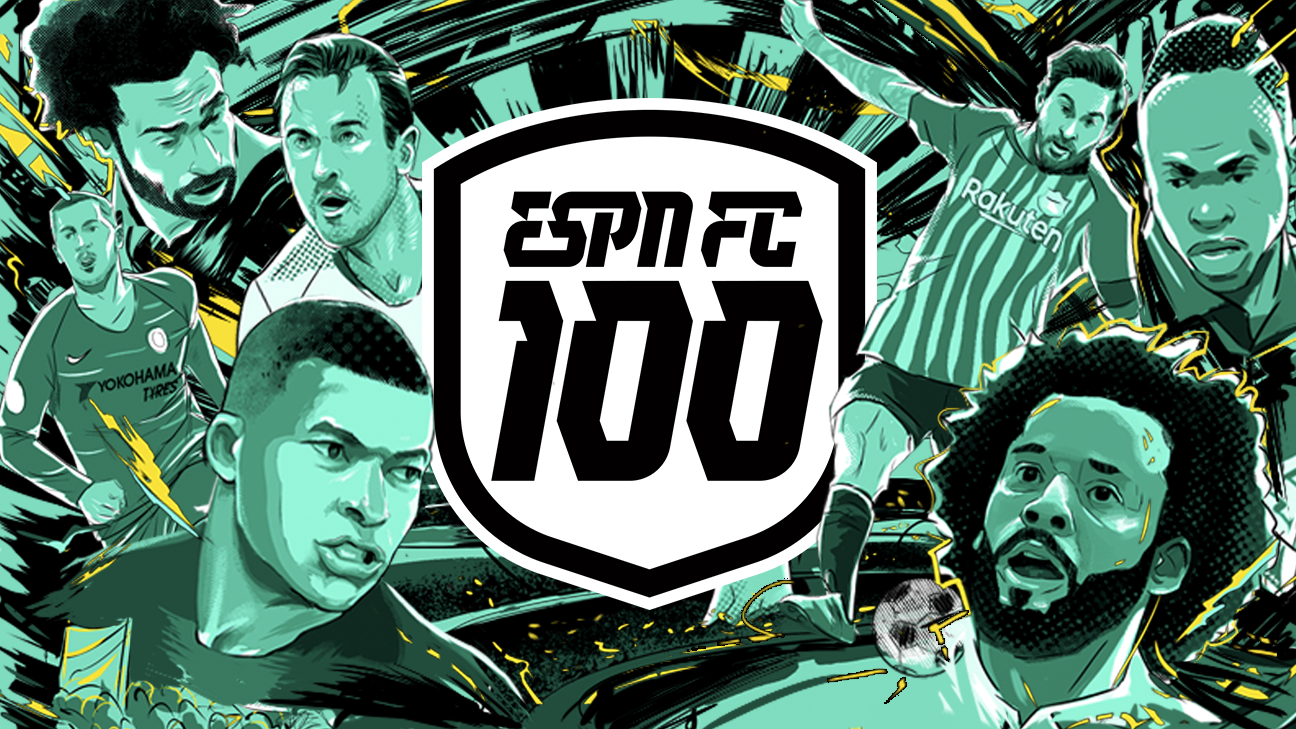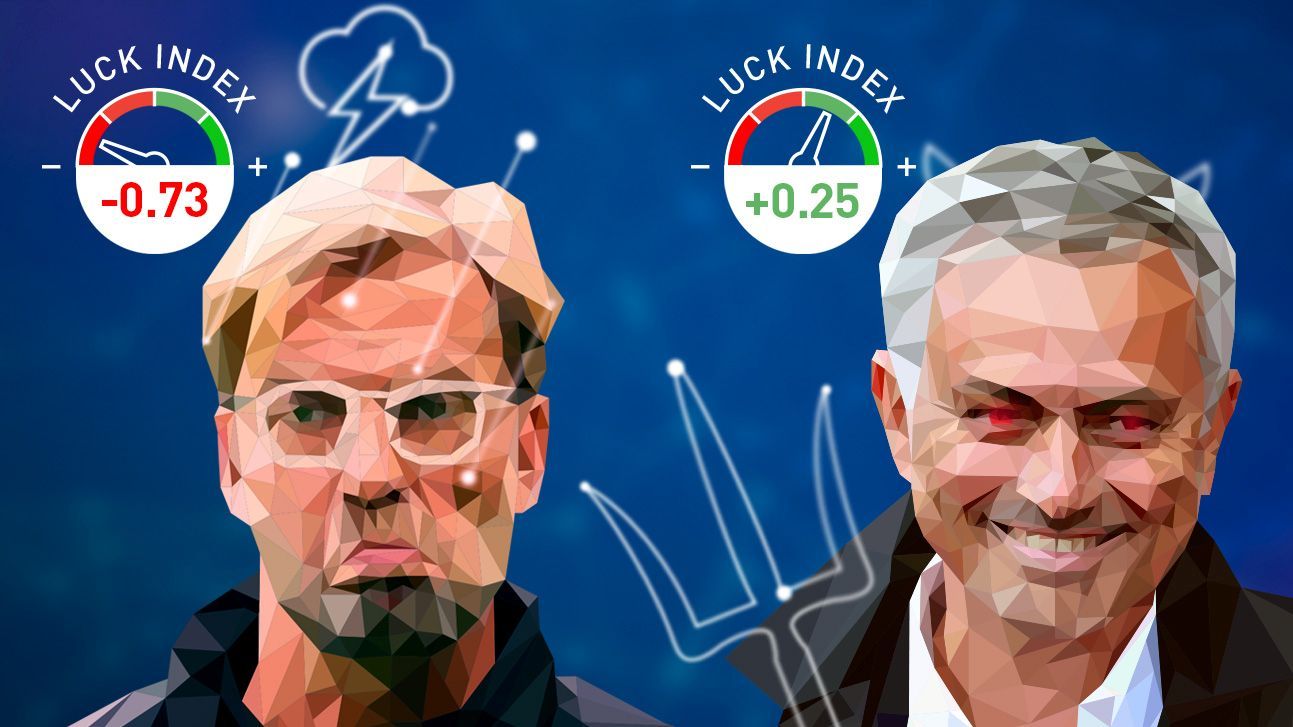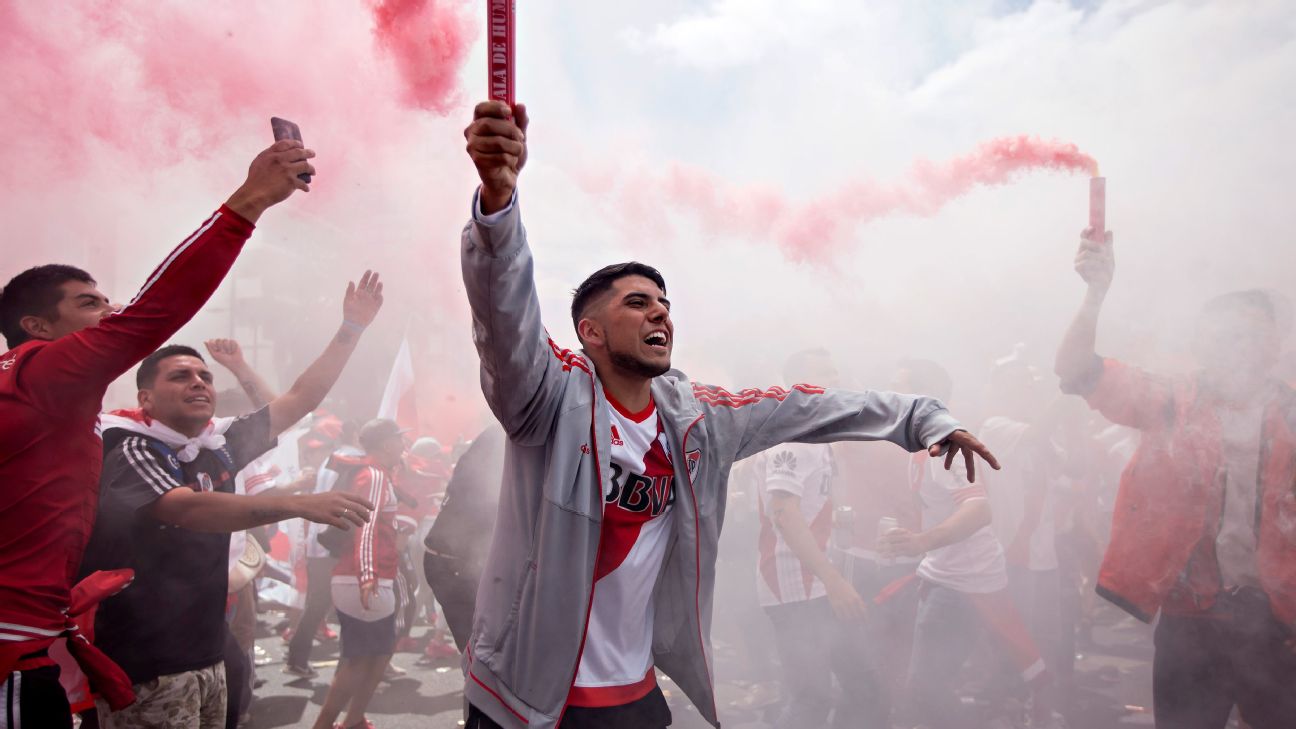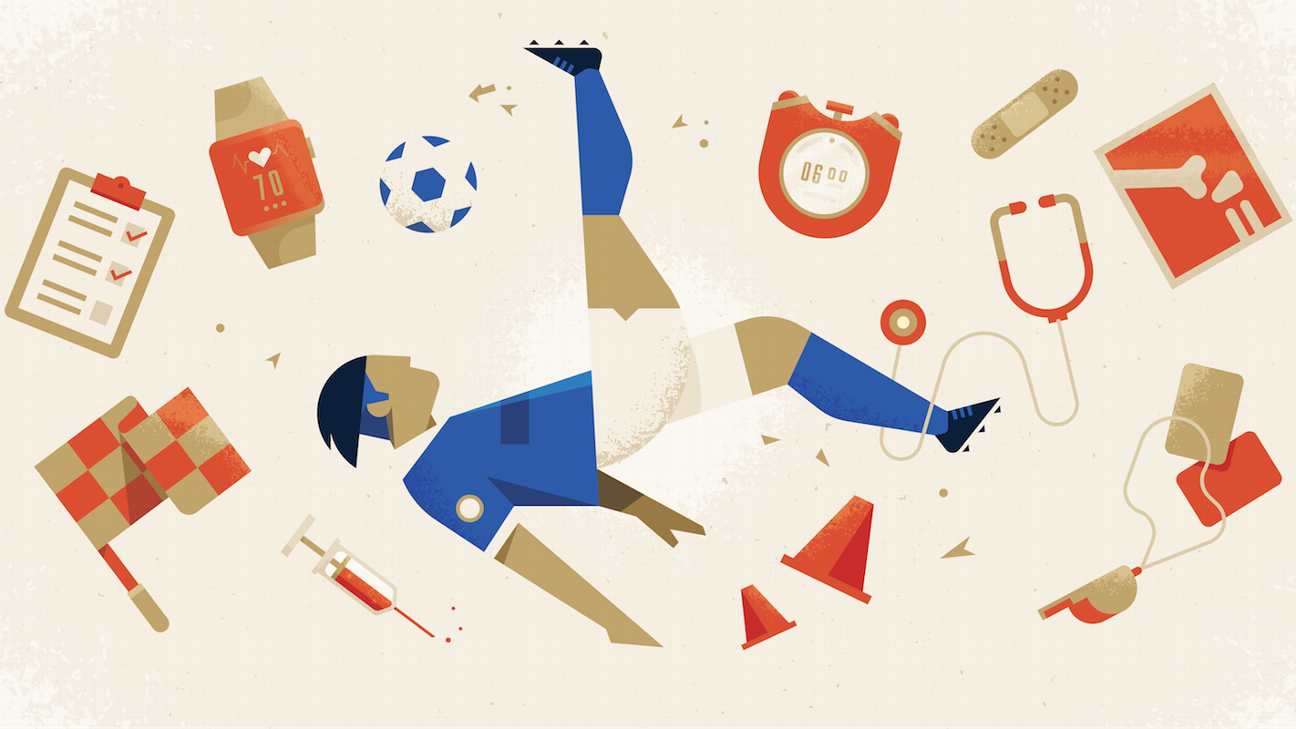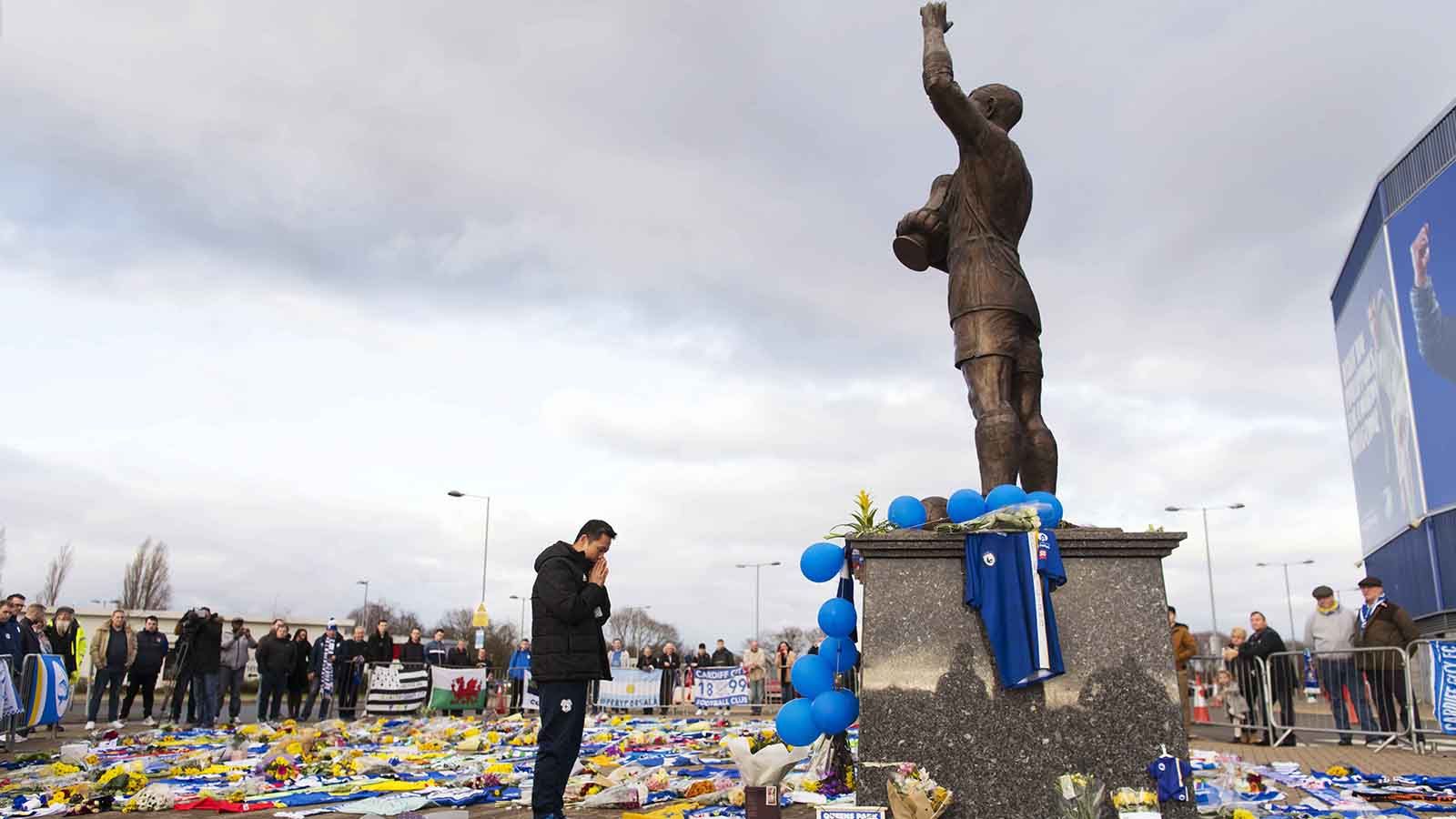
In Search of Emiliano Sala
The tragic disappearance of Emiliano Sala, bound for new club Cardiff on a single-engine plane, raises the question: How did this happen?
This is an ESPN FC feature.
Jean-Philippe Roussel pulled open the door of his hair salon.
It was early evening on Jan. 19, dark and cold and already well past closing time for a Saturday. But Roussel, whose storefront is just down the street from the brasserie and the creperie and the modest church in the center of Carquefou, a French village on the outskirts of Nantes, stayed late to accommodate a friend. Emiliano Sala stepped inside.
Sala had called Roussel that morning. A forward for FC Nantes, a club near the bottom of the table in Ligue 1, Sala had just been in for a haircut two weeks earlier; normally, he waited three weeks between cuts.
This was different. After more than three seasons playing for Nantes, Sala, a 28-year-old Argentine, had been sold to Cardiff City of the English Premier League, a big deal for both clubs. Sala had signed his new contract Friday. He was to report to his new team Monday night. These days in the middle, then, were for saying goodbye.
So Sala made the rounds. He loved Carquefou, loved the quiet and the quaintness and the charm. He loved the farm behind his house, where his rescue dog, Nala, ran off the leash, skipping among ducks and chickens and cows, including a pair named Prune and Pomponette. He loved the small vineyard, just across the road, where they make Muscadet wine and he could walk with Nala among the grapes. He loved the streams that spike off from the Erdre river, where his friends could fish for pike.
He loved the people. He stopped to see Dominique and Martial, the butchers at Maison Garnier, where he bought veal Milanese twice a week and would sign autographs on cards that other customers left for him at the counter. At the bakery, he saw Blandine, who knew to have a feuillantine, or apple pie, ready for him to buy on the day before every game. He went to the tabac, where he bought his cigarettes and walked past Snoopy Coif, where Alexia the groomer gave Nala her baths.
“I am now aboard a plane that seems like it is falling apart.”
- Emiliano Sala, to friends in a WhatsApp message shortly before his plane vanishedSala finished at the salon. He and Roussel became close over the years -- Roussel invited Sala to join his family at Disneyland two Christmases ago -- and Roussel sensed Sala felt conflicted about his transfer. Sala was not completely sure he wanted to leave France, but Nantes reportedly sold him for £15 million (about $19.7m), and soccer is a business, Sala said. Even if Cardiff City isn't one of the Premier League's biggest clubs, it was an opportunity to step up in class, and Sala mentioned that one of his first games would be against Arsenal.
He told Roussel to come and visit him in Wales.
"Worst case, I'll come and cut your hair and we can watch some games," Roussel said, and they laughed.
After Roussel finished with Sala's standard tapered trim, Sala reached to pay and Roussel told him to put away his wallet. Sala then took a Nantes jersey from his bag and offered it as a gift. "I know it's not your favorite," he said -- Roussel actually roots for Marseille, not Nantes -- but Roussel cradled it. They hugged, and parted with damp eyes.
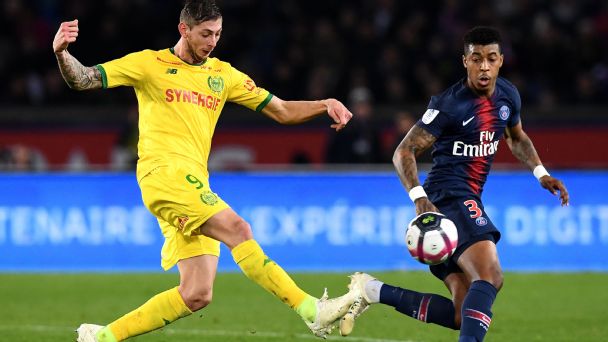
Sala, left, was having a superb season for Nantes, scoring 12 goals and notching three assists in 19 Ligue 1 appearances. Franck Fife/AFP/Getty Images
The next day, Sala finished packing up his house, leaving one pile of furniture to be moved to Cardiff and another tabbed for the dump. On Monday, he visited the training ground in Nantes, a city on the Loire River in western France, roughly 200 miles from Paris. He wanted to take one last picture with his teammates -- he posted it on Instagram with the caption "La ultima ciao," or the "the last goodbye" -- and he headed to the airport.
At 7 p.m., he boarded a small private plane with an English pilot, David Ibbotson. At 7:15 p.m., the single engine Piper PA-46 Malibu took off for Cardiff. While in flight, Sala sent an audio message to a group chat that includes other Nantes players in which he said, relatively calmly, that he was tired from all he had done in Nantes and was headed to Cardiff for training with his new team. He also said, in much the same exhausted tone, that he felt the plane "seems like it's falling apart."
At approximately 8:30 p.m., air traffic control in Jersey, one of the tiny Channel Islands between France and mainland Britain, received a request from the plane to descend. Moments later, the plane disappeared from radar at 2,300 feet.
A search began almost immediately. John Fitzgerald, who owns a custom photography studio and also leads the volunteers who make up the air search rescue team on Guernsey, another of the larger Channel Islands, just happened to be at the hangar when the distress call came in from the coast guard. Fitzgerald and the other volunteers always train on Monday nights, and they had just finished a series of stress-management exercises.
Within 30 minutes, they were in the air, and with night-vision goggles in place, they retraced the path of the plane up until the point it dropped off the radar. Other planes joined the search, and lifeboats went out, too, despite the high winds and choppy seas. Until 2 a.m., beneath heavy clouds and a darkened moon, everyone scoured the murky waters, looking for any sign of the plane or a life raft or anything, really.
They found nothing.
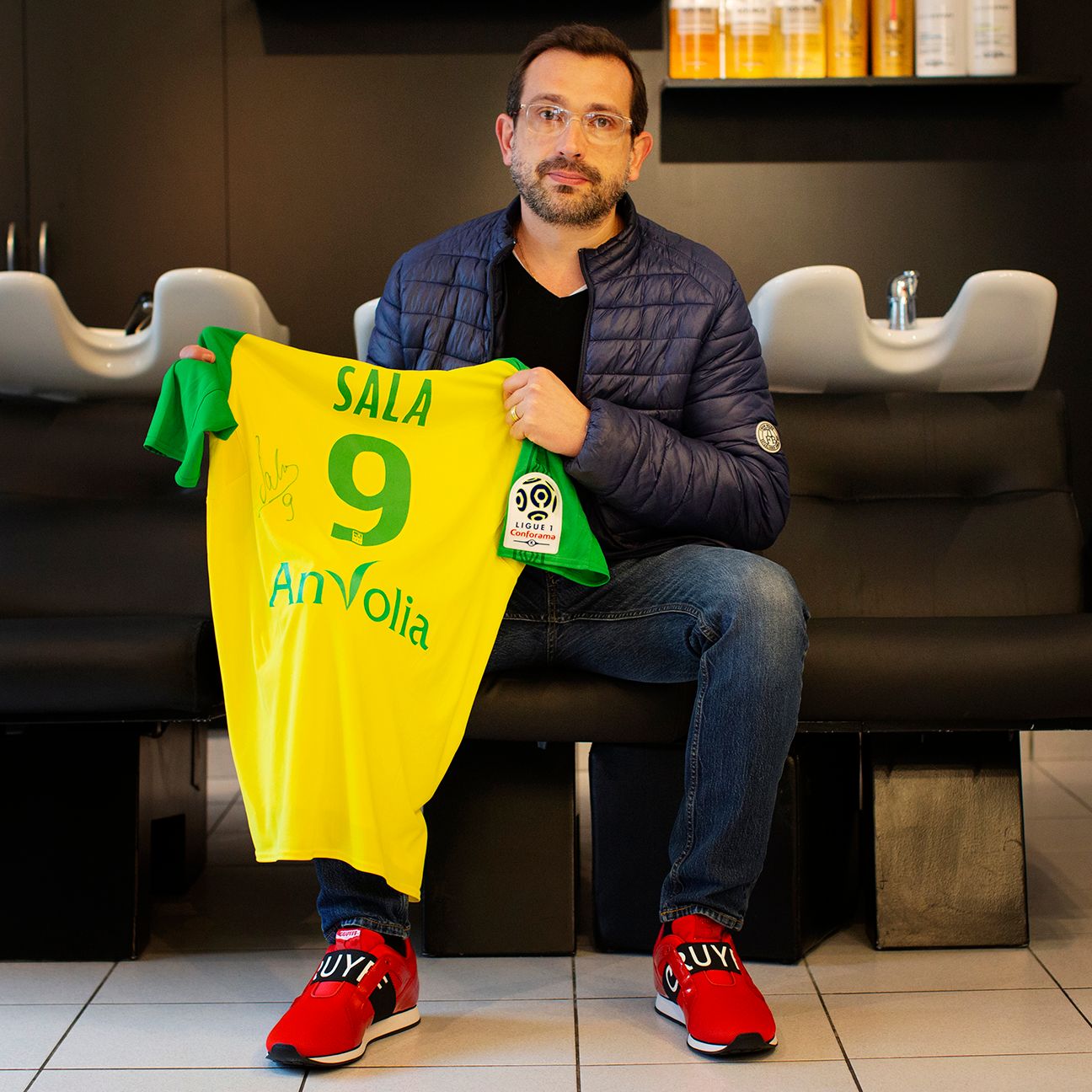
Sala's hairdresser, Jean-Philippe Roussel, sits with the shirt he received from the Nantes striker before he left for Cardiff. Julie Glassberg for ESPN
There is a saying in French, mouiller le maillot, which translates literally as "wet the jersey" but is most commonly used to describe a player who sweats: a fighter, a battler, a tireless worker who never stops. It is high praise, and it is what the Nantes fans said about Sala all the time.
Perhaps that is why, as the news filtered out in Nantes late Monday and into Tuesday morning, there was initially a faith -- blind, maybe, but faith nonetheless -- that Sala would be found. Fans flocked to the Nantes practice facility to leave flowers and cards and pictures and jerseys in front of the gates, lighting candles and writing letters to Sala. A poster with a large portrait of Sala's face and the words "GARDONS ESPOIR" ("keep hope") stretched along the fencing.
It was easy to understand. Sala's connection to Nantes, and to France, was special. He was born in Cululu, Argentina, but left home at 15 to join a development academy for young players in a neighboring Argentine province. The academy had ties to Bordeaux, and Sala traveled to Europe over the next four years to play with different clubs before signing his first professional contract with Bordeaux in 2010. He was 19.
At first, it seemed he might not break through as a star, struggling to establish himself with the first team and being sent on loan to smaller clubs like Caen. It was not until July 2015, when Nantes bought him from Bordeaux, and he finished that season as the club's top goal scorer, that it felt he had arrived. He scored 42 times for Nantes over the next three-and-a-half seasons.
Sala's journey, as well as his penchant for fearlessly trying to score with his head, made him beloved by Nantes fans, who often chanted his name at the stadium. For those who saw him around town, his on-field steeliness morphed into a quiet passion. Before games, he would stop at the Saint Pierre church to pray, falling to his knees next to the statue of the Virgin Mary. In September, when his mother was visiting, they prayed together and the priest, Guillaume Le Floch, was struck by Sala's quiet fervor. He put his hand on Sala's shoulder. "Emiliano, may God bless you and guide you," he said. Sala nodded.
Even this fall, as speculation increased that a bigger club would try to buy him (Everton was among other clubs rumored to have interest), Sala kept to his routines. Matt Miazga, an American defender who played for Nantes during the first half of this season, would sit next to Sala on the stationary bikes the players rode to warm up before each training session.
From the beginning, Sala and Miazga practiced their languages on each other -- Miazga learning French, Sala learning English -- and inevitably ended up in a fit of cackling. When media reports about Cardiff City's interest in Sala intensified, Miazga stepped up his lighthearted critiques of Sala's linguistics, telling him, "You'd better start learning! You're going to need it!"
By the middle of January, he did. Sala made his last appearance for Nantes on Jan. 16 and traveled to Cardiff to have a physical Jan. 18.
Midway through his physical, Sala stopped by Cardiff's training fields and visited with his new teammates. He ran into his manager, Neil Warnock, who had come to France several times to see Sala play during the recruitment period.
Warnock, a 70-year-old veteran coach, had taken to Sala, already begging forgiveness from him for struggling with his name. Instead of "Emiliano," Warnock said, he hoped it would be all right to call Sala "Emil," because, he explained, "I get all the names wrong and it's a bit too long for me." Sala agreed.
That Friday, Warnock lit up when he saw Sala, chuckling at his new player's rumpled casual clothes. "You're going to fit right in around here," Warnock said.
"I'll score you the goals," Sala told him. Warnock smiled. "I know you will."
Warnock then offered Sala the chance to join the team as it went up to Newcastle for a league game the next day. He wouldn't play, of course, but it would be an opportunity to experience being with the team, to see the tactics. Sala said he appreciated the offer but wanted to make sure he had a chance to tie up things at home.
He needed to finish packing. He needed to make his rounds in Carquefou. He needed to sort things out with his landlord, the farm owner, Michel Auray, who rented him the house and would sometimes walk around the property with him, talking about the animals. He needed to pick up Nala, too. Sala left his Labrador with his teammate, Nicolas Pallois, while he was away but now he needed to take her to a kennel before starting the process to bring her to Wales.
On Saturday, then, Warnock and Cardiff City played in northwest England. Sala went south. The plan was to see him for training on Tuesday morning.
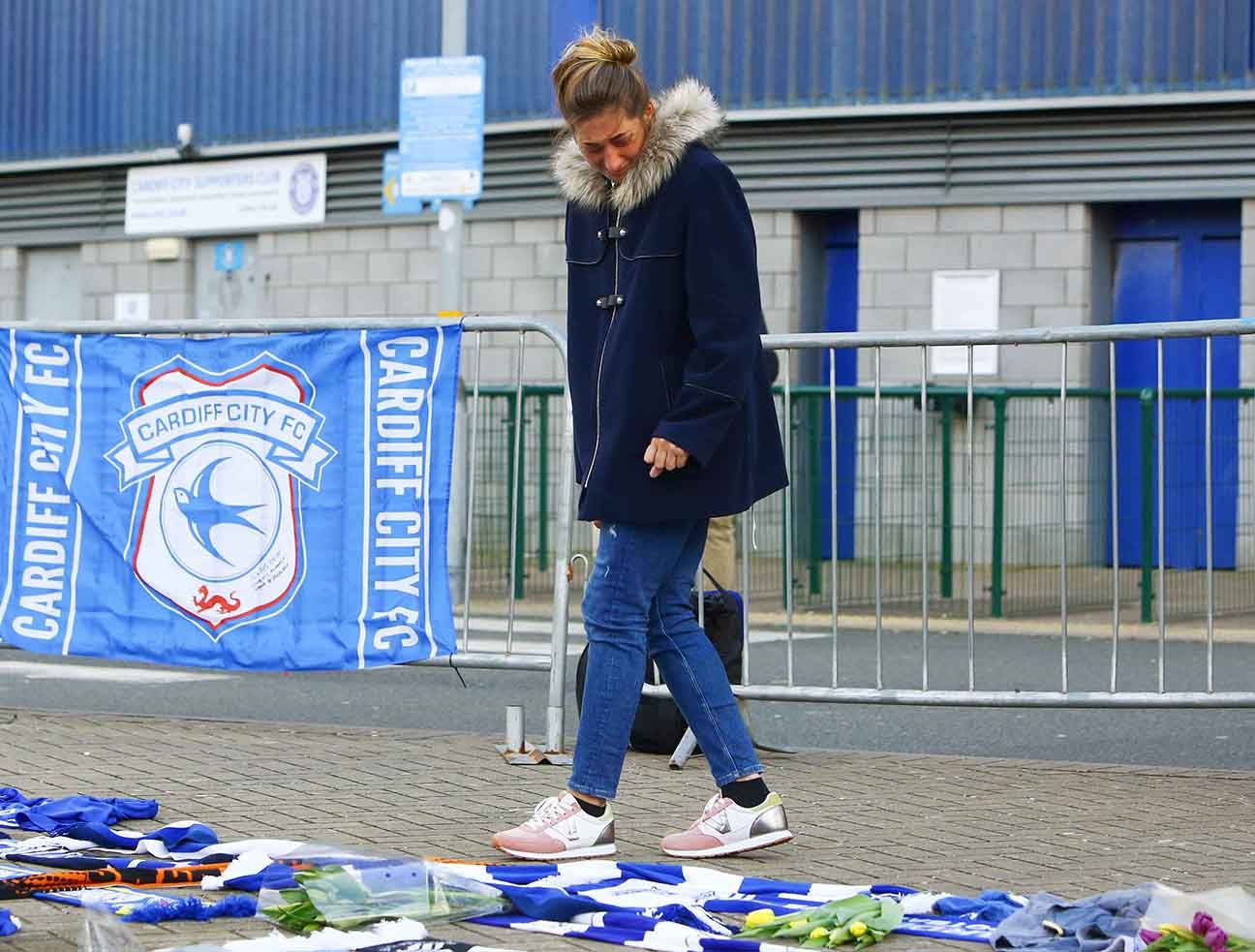
Romina Sala, Emiliano's sister, visits the tributes outside Cardiff City's stadium a day after the police ended the official search for her brother. Geoff Caddick/AFP/Getty Images
By Wednesday, when Sala's sister, Romina, arrived in Cardiff from Argentina, the two questions most pressing for her were the same ones anyone would wonder: What was her brother doing on that particular plane? And how was it possible that, after nearly two days of searching, no trace of anyone, or anything, had been found?
Neither question had a clear answer. Romina learned that Cardiff City was not involved in booking Sala's travel; the club had offered to purchase him a commercial flight from Paris -- which would have involved a connection -- but Sala chose to make other arrangements.
At the heart of those plans was a high-profile soccer agent named Willie McKay, who does not represent Sala but has one son, Mark, who helped represent Nantes in the transfer deal with Cardiff City and another, Jack, who plays for Cardiff.
With clients scattered all over Europe, Willie McKay often hired private planes and pilots to move clients or team executives from place to place. So, with Sala needing to get from one small city (Cardiff) to another (Nantes) and back again in a short period, it was not unusual for him to get involved.
In a series of text messages that Willie McKay released after the plane disappeared, Jack McKay told Sala that his father had organized a private plane for him, if he wanted to use it. Sala was grateful, and pleased when McKay told him it would not cost Sala anything "if you help me to score goals." Sala replied, "Hahaha with pleasure."
The two then set up the timing for the first flight from Cardiff to Nantes on Saturday, and the return Monday evening. Sala seemed to know the plane would be small, as he sent McKay a picture of his luggage to ask if it would fit.
McKay told the BBC that he had set up the flights through David Henderson, a veteran pilot he knew who had flown his players "all over Europe on countless occasions." It was not clear how Ibbotson, the pilot who flew the flight, ended up with the job, though Warnock, the Cardiff City manager, said he had flown flights with Ibbotson in the past and recalled him as a "fabulous" pilot. Henderson has not commented publicly since the incident.
Ibbotson, a semi-commercial pilot, also worked as a gas engineer and often flew skydiving flights. He checked in on Facebook from the Nantes airport on Saturday, joking with friends in the comments that he was "a bit rusty" with the controls on the plane, and there have been questions raised in the aftermath about the safety of flying a single-engine plane over the English Channel in unpredictable weather at night.
Fitzgerald, the leader of the rescue team on Guernsey, said that one of the basic challenges is that if something goes wrong with the plane, "ditching," or landing a small plane on water, is incredibly difficult without daylight. "The problem with the sea is you don't get a huge visual perception of heights," he said. "You could be 500 feet or 1,000 feet and it looks the same."
The search itself was a different sort of issue. At first, Fitzgerald and his team were looking for people on the water with their search, hoping to see flashing lights on life jackets or pick up a reading from a beacon on a life raft.
As the hours passed and that possibility became more remote, they still hoped to see anything -- part of the plane, an oil slick that rose to the surface -- to indicate if the aircraft had struck the water. They never did. And after more searching through Tuesday and Wednesday also failed, the harbor master called off the official search for the plane Thursday, one day after Romina arrived.
Sala's sister immediately issued a tearful plea for the search to continue. "Down in my heart, I know that Emiliano, who is a fighter, is still alive," she said, and many in the soccer world (including stars such as Lionel Messi and Kylian Mbappe) took up the call, raising hundreds of thousands of dollars on a GoFundMe page to pay for a private search.
A shipwreck expert, David Mears, has been brought in and he traveled to Guernsey with Sala's family over this past weekend to continue the search. Three days later, seat cushions believed to be from the plane were discovered on a French beach, but there continued to be no sign of Sala, Ibbotson or the body of the plane itself.
After so much time, according to Mears, the next step will be to bring in different equipment to advance the search to a new phase. At this point, he said, the search must shift its focus underwater.
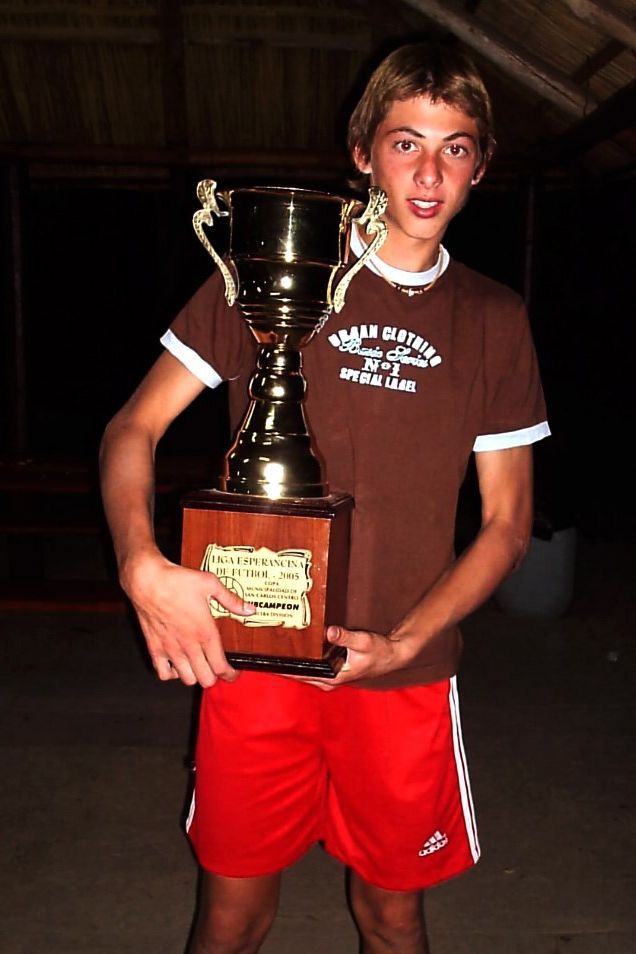
Sala, photographed during his days at his first club, Argentine side San Martin de Progreso. Daniel Ribero/San Martin De Progreso/EPA
It rained Tuesday night in London. Eight days after Sala's plane disappeared, it poured down at the Emirates Stadium for what would have been his first game with Cardiff City, the one he talked excitedly about with Roussel in the salon. The players were soaked during their warm-ups, then again when they walked out for kickoff. No matter. Remember? Mouiller le maillot. Sala's jersey would have been sopping anyway.
There were tributes. Executives and team staff wore yellow flowers on their lapels, a nod to yellow being Nantes' primary color. Sala's name was included in the program with a daffodil where his number would have gone. Cardiff City fans held up yellow placards before the match and the captain of each team carried bouquets of daisies and tulips to the middle of the field, placing them on the center spot.
It felt strange. The stadium announcer made sure not to use words like "remembrance" or "in memory" when he talked about Sala, being sensitive to the idea that Sala's family is pushing on with the search. But the juxtaposition was brutal: Sala went back to Nantes to see his teammates once more and his friends once more and his town once more, stopping in at all his regular spots for a bit of closure. Now, a week on, his family can only pray that it will find some.
Sports always moves quicker. Sala's sister and his mother are still in Guernsey, but on Wednesday, Nantes plays its first game since Sala disappeared, and Warnock, who said he was so wracked over the past week that he spoke to a therapist and considered walking away from coaching altogether, also said he felt an obligation to be on the sideline Tuesday. There was no choice, he said, other than to help his players and his team's fans start to move on.
So the flowers were placed. The players linked arms. And the fans stood, some holding Argentina jerseys or Nantes jerseys, some clutching yellow scarves or flags. It was supposed to be different for those who made the trip from Cardiff. It was supposed to be a celebration. But instead of watching a bright new signing run out for his team, all they could do was share a minute of reflection for him.
The players bowed their heads. The fans raised their arms. The rain never let up. It was a moment to consider who Emiliano Sala was. It was a moment to imagine what he might have been.
Freelance reporter Benoit Morenne contributed to this report.
